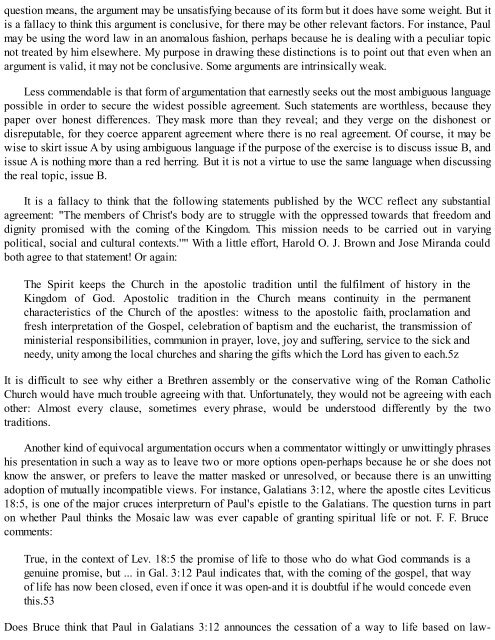Exegetical Fallacies - D. A. Carson
Exegetical Fallacies - D. A. Carson
Exegetical Fallacies - D. A. Carson
Create successful ePaper yourself
Turn your PDF publications into a flip-book with our unique Google optimized e-Paper software.
question means, the argument may be unsatisfying because of its form but it does have some weight. But it<br />
is a fallacy to think this argument is conclusive, for there may be other relevant factors. For instance, Paul<br />
may be using the word law in an anomalous fashion, perhaps because he is dealing with a peculiar topic<br />
not treated by him elsewhere. My purpose in drawing these distinctions is to point out that even when an<br />
argument is valid, it may not be conclusive. Some arguments are intrinsically weak.<br />
Less commendable is that form of argumentation that earnestly seeks out the most ambiguous language<br />
possible in order to secure the widest possible agreement. Such statements are worthless, because they<br />
paper over honest differences. They mask more than they reveal; and they verge on the dishonest or<br />
disreputable, for they coerce apparent agreement where there is no real agreement. Of course, it may be<br />
wise to skirt issue A by using ambiguous language if the purpose of the exercise is to discuss issue B, and<br />
issue A is nothing more than a red herring. But it is not a virtue to use the same language when discussing<br />
the real topic, issue B.<br />
It is a fallacy to think that the following statements published by the WCC reflect any substantial<br />
agreement: "The members of Christ's body are to struggle with the oppressed towards that freedom and<br />
dignity promised with the coming of the Kingdom. This mission needs to be carried out in varying<br />
political, social and cultural contexts.'"' With a little effort, Harold O. J. Brown and Jose Miranda could<br />
both agree to that statement! Or again:<br />
The Spirit keeps the Church in the apostolic tradition until the fulfilment of history in the<br />
Kingdom of God. Apostolic tradition in the Church means continuity in the permanent<br />
characteristics of the Church of the apostles: witness to the apostolic faith, proclamation and<br />
fresh interpretation of the Gospel, celebration of baptism and the eucharist, the transmission of<br />
ministerial responsibilities, communion in prayer, love, joy and suffering, service to the sick and<br />
needy, unity among the local churches and sharing the gifts which the Lord has given to each.5z<br />
It is difficult to see why either a Brethren assembly or the conservative wing of the Roman Catholic<br />
Church would have much trouble agreeing with that. Unfortunately, they would not be agreeing with each<br />
other: Almost every clause, sometimes every phrase, would be understood differently by the two<br />
traditions.<br />
Another kind of equivocal argumentation occurs when a commentator wittingly or unwittingly phrases<br />
his presentation in such a way as to leave two or more options open-perhaps because he or she does not<br />
know the answer, or prefers to leave the matter masked or unresolved, or because there is an unwitting<br />
adoption of mutually incompatible views. For instance, Galatians 3:12, where the apostle cites Leviticus<br />
18:5, is one of the major cruces interpreturn of Paul's epistle to the Galatians. The question turns in part<br />
on whether Paul thinks the Mosaic law was ever capable of granting spiritual life or not. F. F. Bruce<br />
comments:<br />
True, in the context of Lev. 18:5 the promise of life to those who do what God commands is a<br />
genuine promise, but ... in Gal. 3:12 Paul indicates that, with the coming of the gospel, that way<br />
of life has now been closed, even if once it was open-and it is doubtful if he would concede even<br />
this.53<br />
Does Bruce think that Paul in Galatians 3:12 announces the cessation of a way to life based on law-



